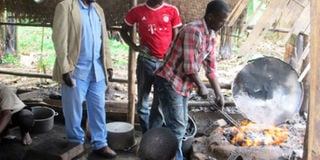Ntungamo youth earn from metal scrap

Badru Atwijukire (right), flanked by his workmates, stirs the boiling material in the process of making a saucepan. PHOTO BY PEREZ RUMANZI
Ntungamo- After dropping out of school six years ago for lack of school fees, Badru Atwijukire, 25, decided to enroll for training in metal fabrications at a workshop in Ntungamo Town.
The Senior Three drop-out was determined to have a source of income to sustain himself and pay fees for his siblings, who were still in lower primary classes.
Atwijukire is the oldest in a family of eight children and their father passed on.
He acquired the necessary skills in seven months of training and got employed at the workshop where he worked for almost a year.
However, an opportunity for him to gain more skills opened.
His uncle, Brason Mwesigwa, who had trained from Kenya in several artisan industrial skills, offered to train him and other young boys from the family at their home in Rwangusha village, Ntungamo Sub-county.
Mwesigwa trained Atwijukire how to smelt scrap and remodel it into several items, including saucepans.
Together with other 15 youths from the area, they established a workshop called Bangirana Metal Works.
They have been making saucepans for almost five years now. They make up to 30 saucepans and several other items a day.
The workshop is located 4kms out of Ntungamo Town on Ntungamo-Rukungiri Road.
Their raw materials include motor vehicle parts, mainly made out of aluminum.
“Our raw materials are basically scrap, which we buy from garages or scrap collection centres. At times we compete with those who want to reuse them as spares parts in vehicles. The materials are so expensive and scarce, which limits our production,” Atwijukire says.
Apart from scrap, they must also have building sand, charcoal and timber. They have a fan developed from a bicycle wheel with the end point pointing into a furnace where charcoal is put.
A metallic container is placed on the fire with raw materials broken down into smaller pieces; they are heated to boil into liquid material. Someone keeps rolling the wheel to produce wind that stokes the fire to a higher temperature. They also keep monitoring and stirring the materials being boiled to ensure everything turns into liquid.
Atwijukire says they first identify the size and shape of the saucepan they want to make. They then make a wooden crate, slightly bigger than the saucepan but of the same width and height as the intended saucepan. The crate has a hole (small opening) at the bottom. They place the saucepan in the crate. They put wet sand in the saucepan and compact it. They also put sand around the saucepan (in the crate) and compact it.
They then remove the saucepan and turn it upside down on a flat surface, pull it out, leaving a compact heap of sand in shape of saucepan facing down. They then bring the crate, still with the compacted sand but has the gap where the saucepan was seated, and fit it into the heap of compacted sand. They also place the crate facing down. This leaves the space in between in a shape of a saucepan. They then pour the boiling metals through the hole/opening on top of the crate.
The process of formation and cooling of a new saucepan takes less than a minute. The outer sand is then demolished to reveal a new saucepan from the liquid poured. The sand inside the new saucepan has also weakened and it is crumbling.
“When Atwijukire was training me, it looked as if I would never get the technology, but when we started working, the thing became simple and I enjoy doing it every day. I now have the money I wanted and I think in future, I will be making more money,” Salim Gumisiriza, one of the group members, says.
They use a hand filer to remove sharp particles from the saucepan and smoothen it before being taken to the market.
Atwijukire says there is always ready market for any product they make. Their products are mostly taken to weekly and monthly markets in Ntungamo District. They also produce on order for traders who want to buy their products in bulk.
While they buy raw materials at Shs13,000 a kilogramme, a saucepan is sold at between Shs8,000 to Shs150,000, depending on the size.
Other products
They also make metal doors, design materials for gate doors and ash trays. They make candle holders as well, which are sold between Shs1,500 and Shs8,000.
The group members say they have asked for support from government but have never been considered.
“We have applied five times to be considered in the Youth Livelihood Programme but they have never even assessed us. When we ask them [YLP officials] why, they ask us whether we do any agriculture too, but for us we are for metals, may be they do not understand what we do,” says Adam Amanya, another member of the group.
Amanya says if they get external support, they would be able to establish a more modern workshop that may use electricity and even produce more items and train more youth.
Mr Bright Joga, the Ntungamo Sub-county senior assistant secretary, says whereas they have seen the group’s many products displayed on the road side, they have always thought that they were made from somewhere and brought there for marketing.
[email protected]




